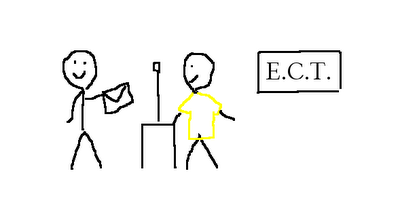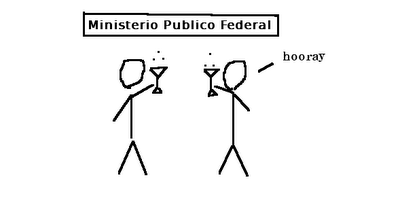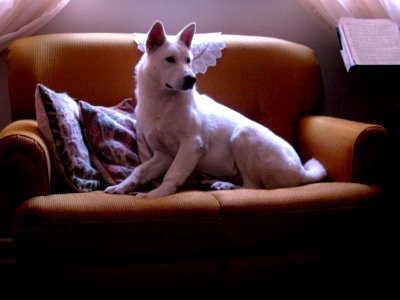Que horas são em São Paulo, Brasil ?
quarta-feira, novembro 29, 2006
Eliane Coelho na Tosca de Puccini - Vissi d'Arte
A "nossa" grande Eliane Coelho numa maravilhosa interpretacão da famosa ária "Vissi d'Arte".
BRAVISSIMA !!!!!
BRAVISSIMA !!!!!
domingo, novembro 26, 2006
26 de Novembro

"Então disse o Senhor a Josué: Levanta-te; por que estás prostrado assim sobre teu rosto?" Josué 7.10
A disposição para ser corrigido
Este é um ponto delicado. Não existe nada que perscrute tanto o coração como a oração. Quando oramos, comparecemos na santa presença de Deus, e é feita como que uma radiografia até o mais íntimo do nosso ser. Tudo é manifesto, e se existe um pecado atrapalhando a comunicação com o Senhor, Deus não aceita dizermos simplesmente: "Senhor, caso haja algo errado em minha vida..." Essa é uma desculpa barata. Se existe algo, o Senhor coloca o Seu dedo ali e nos mostra qual o motivo que nos impede de chegar à Sua presença. Vemos isso no caso de Josué: "Então Josué rasgou as suas vestes, e se prostrou em terra sobre o seu rosto perante a arca do Senhor até a tarde..." Devemos estar dispostos a sermos corrigidos! "Então disse o Senhor a Josué: Levanta-te; por que estás prostrado assim sobre o teu rosto?" Se desistirmos do falatório vazio e vão que muitas vezes é a nossa oração, se deixarmos de lado o formalismo religioso que muitas vezes caracteriza as orações dos cristãos, e chegarmos à presença do Senhor, também haverá em nós a disposição de sermos corrigidos. Não terá sentido participar de reuniões de oração se não existir essa disposição de aceitar a correção do Senhor. Oração verdadeira é disposição para ser corrigido.
quarta-feira, novembro 22, 2006
segunda-feira, novembro 20, 2006
domingo, novembro 19, 2006
sexta-feira, novembro 17, 2006
quarta-feira, novembro 15, 2006

15 de Novembro
"Damos sempre graças a Deus por todos vós, mencionando-vos em nossas orações." 1 Tessalonicenses 1.2
Eu sei que muitos crentes desperdiçam seu poder de oração contando ao Senhor como é pesado para eles lidar com essa ou aquela pessoa, e acabam enumerando todos os males diante do Senhor. Mas quando se aprende a conhecer o Senhor no louvor, surge a gratidão por todos os irmãos. Paulo escreve aos filipenses: "Dou graças ao meu Deus por tudo que recordo de vós." Os filipenses eram bons cristãos, bem orientados e fiéis, que apoiavam Paulo. Por isso você poderia dizer que era fácil para Paulo agradecer por eles, segundo o princípio: "Se você for bom para mim, eu serei bom para você." Mas Paulo também agradeceu por irmãos difíceis e indesejáveis. Vemos isso na primeira carta aos coríntios. Os coríntios haviam crescido muito pouco na sua vida de fé. Paulo teve muito trabalho com eles e teve de admoestá-los seriamente. Mas ele começou a dar graças pelos coríntios. Porém, o que havia na vida dos coríntios que merecia agradecimento diante do Senhor? Pois havia muita contenda, disputa, inveja e difamação na igreja de Corinto, e a mesma até havia atacado a Paulo. Então que razões havia para dar graças? "...A propósito da sua graça (de Deus)." Mesmo no crente mais problemático ainda se encontra o melhor: a graça de Deus.
Helping a Worthy Cause by Flexing a New Freedom
By VIVIEN SCHWEITZER
Published: November 14, 2006
There was a festive atmosphere at the Richard Tucker Music Foundation’s annual gala on Sunday at Avery Fisher Hall. This was largely because Peter Gelb, the new general manager of the Metropolitan Opera, has raised the iron curtain that previously barred singers under Met contract from appearing at fund-raising benefits.

Nan Melville for The New York Times
Patricia Racette and the conductor Asher Fisch at Avery Fisher Hall.
Readers’ Opinions
Forum: Classical Music
It seems fitting that Mr. Gelb, who has recently reached out to passersby in Times Square and to David Letterman’s audience, has made peace with the Tucker Foundation, which supports young opera singers. And Sunday’s enthusiastic audience could enjoy prime Met artists, some singing roles they had not performed in New York.
That included the Boris of René Pape, the dashing German bass, who with his regal bearing and chiseled features looks like a man born to be king. In the coronation scene from Mussorgsky’s “Boris Godunov” Mr. Pape’s basso cantante sounded arrestingly powerful, although he was rather stentorian in the lighthearted “So in Love” from Cole Porter’s “Kiss Me, Kate.”
Another New York debut role was Patricia Racette’s convincing Desdemona in Act III, Scene II of Verdi’s “Otello.” But Ms. Racette, winner of the 1998 Richard Tucker Award, given to an artist on the “threshold of a major career,” sounded even better in “L’altra notte in fondo” from Boito’s “Mefistofele.” Dressed in a shimmering gold dress, she vividly conveyed Marguerite’s anguish, her creamy, gleaming voice spinning out expressive phrases with perfectly controlled vibrato.
James Morris, bass-baritone, sang an emotive, powerful “Ves tabar spit” from Rachmaninoff’s “Aleko” and a chilling “Credo” from Verdi’s “Otello.” Samuel Ramey, the veteran bass, sang “Ascolta. S’agita il bosco ... Ecco il mondo” from “Mefistofele” with devilish flair and slightly frayed lower notes.
The tenor lineup included José Cura of Argentina, singing with swaggering machismo “Tutto parea sorridere ... Si, de’Corsari il fulmine,” from “Il Corsaro” by Verdi.
Marcello Giordani sang “Un dì all’azzurro spazio” from “Andrea Chénier” with ardent, flowing passion, although he sounded slightly forced in “Vicino a te.” He performed that duet (also from “Andrea Chénier”) with Aprile Millo, the soprano who won the 1985 Richard Tucker Award and here sounded somewhat metallic.
The young Maltese lyric tenor Joseph Calleja offered an expressive “Ah! Lève-toi soleil” from Gounod’s “Romeo and Juliet” with youthful passion and occasionally strained high notes. He also sang Alfredo in excerpts from “La Traviata” alongside the tortured Violetta of Elizabeth Futral, the excellent coloratura soprano, who looked glamorous in her strapless black Versace gown.
It was a good night for sopranos. Angela Marambio sang “Ecco l’oride campo” from “Un ballo in maschera” with an appealingly robust, warm and pure voice, while Sondra Radvanovsky brought dramatic flair and a rich, lustrous sheen to “Ernani, Ernani involami” from “Ernani.”
Lawrence Brownlee, winner of the 2006 Tucker Award, was absent because of a previous commitment. Instead, the program featured the sextet from “Lucia di Lammermoor” with other talented young singers supported by the foundation.
Asher Fisch led members of the Metropolitan Opera Orchestra and the New York Choral Society in rousing performances marred only by a few tempo inconsistencies. Indeed, the evening seemed to be marked by an enthusiastic spirit of collaboration.
Published: November 14, 2006
There was a festive atmosphere at the Richard Tucker Music Foundation’s annual gala on Sunday at Avery Fisher Hall. This was largely because Peter Gelb, the new general manager of the Metropolitan Opera, has raised the iron curtain that previously barred singers under Met contract from appearing at fund-raising benefits.

Nan Melville for The New York Times
Patricia Racette and the conductor Asher Fisch at Avery Fisher Hall.
Readers’ Opinions
Forum: Classical Music
It seems fitting that Mr. Gelb, who has recently reached out to passersby in Times Square and to David Letterman’s audience, has made peace with the Tucker Foundation, which supports young opera singers. And Sunday’s enthusiastic audience could enjoy prime Met artists, some singing roles they had not performed in New York.
That included the Boris of René Pape, the dashing German bass, who with his regal bearing and chiseled features looks like a man born to be king. In the coronation scene from Mussorgsky’s “Boris Godunov” Mr. Pape’s basso cantante sounded arrestingly powerful, although he was rather stentorian in the lighthearted “So in Love” from Cole Porter’s “Kiss Me, Kate.”
Another New York debut role was Patricia Racette’s convincing Desdemona in Act III, Scene II of Verdi’s “Otello.” But Ms. Racette, winner of the 1998 Richard Tucker Award, given to an artist on the “threshold of a major career,” sounded even better in “L’altra notte in fondo” from Boito’s “Mefistofele.” Dressed in a shimmering gold dress, she vividly conveyed Marguerite’s anguish, her creamy, gleaming voice spinning out expressive phrases with perfectly controlled vibrato.
James Morris, bass-baritone, sang an emotive, powerful “Ves tabar spit” from Rachmaninoff’s “Aleko” and a chilling “Credo” from Verdi’s “Otello.” Samuel Ramey, the veteran bass, sang “Ascolta. S’agita il bosco ... Ecco il mondo” from “Mefistofele” with devilish flair and slightly frayed lower notes.
The tenor lineup included José Cura of Argentina, singing with swaggering machismo “Tutto parea sorridere ... Si, de’Corsari il fulmine,” from “Il Corsaro” by Verdi.
Marcello Giordani sang “Un dì all’azzurro spazio” from “Andrea Chénier” with ardent, flowing passion, although he sounded slightly forced in “Vicino a te.” He performed that duet (also from “Andrea Chénier”) with Aprile Millo, the soprano who won the 1985 Richard Tucker Award and here sounded somewhat metallic.
The young Maltese lyric tenor Joseph Calleja offered an expressive “Ah! Lève-toi soleil” from Gounod’s “Romeo and Juliet” with youthful passion and occasionally strained high notes. He also sang Alfredo in excerpts from “La Traviata” alongside the tortured Violetta of Elizabeth Futral, the excellent coloratura soprano, who looked glamorous in her strapless black Versace gown.
It was a good night for sopranos. Angela Marambio sang “Ecco l’oride campo” from “Un ballo in maschera” with an appealingly robust, warm and pure voice, while Sondra Radvanovsky brought dramatic flair and a rich, lustrous sheen to “Ernani, Ernani involami” from “Ernani.”
Lawrence Brownlee, winner of the 2006 Tucker Award, was absent because of a previous commitment. Instead, the program featured the sextet from “Lucia di Lammermoor” with other talented young singers supported by the foundation.
Asher Fisch led members of the Metropolitan Opera Orchestra and the New York Choral Society in rousing performances marred only by a few tempo inconsistencies. Indeed, the evening seemed to be marked by an enthusiastic spirit of collaboration.
sábado, novembro 11, 2006
A nova Internet ( visão dos politicos brasileiros )
Como postar um comentário na nova Internet brasileira do senador Eduardo Azeredo (PSDB-MG).
1. Vá a uma papelaria e compre um Formulário Padrão de Envio de Conteúdo para a Internet.

2. Preencha o formulário em três vias indicando seu nome, endereço, RG, CPF, o site para o qual você quer enviar o conteúdo e o comentário que você quer que seja postado online. Não esqueça de assinar.

3. Vá para o cartório e faça reconhecimento de firma e cópias autenticadas do RG, CPF, e certidão de nascimento.

4. Vá à nova agência governamental de controle da Internet.

5. Peça a um amigável funcionário público para carimbar o seu formulário. Ele vai pedir seu RG, CPF, Título de Eleitor, Carteira de Trabalho, Certificado de Antecedentes Criminais, Carteira de Motorista, um comprovante de endereço, o Certificado de Reservista e algum documento que você não se lembrou de trazer mas sem o qual nada pode ser feito.

6. Volte o dia seguinte com o documento que você não trouxe no dia anterior. Não preste muita atenção para o fato de que o funcionário público não pediu esse documento hoje.

7. Vá ao correio e envie o formulário carimbado, com registro e AR, para o dono do site.

8. Após duas semanas, visite o site e verifique se seu post altamente intelectual e original foi aceito.

9. Comemore sua Internet livre de predadores do orkut!

1. Vá a uma papelaria e compre um Formulário Padrão de Envio de Conteúdo para a Internet.

2. Preencha o formulário em três vias indicando seu nome, endereço, RG, CPF, o site para o qual você quer enviar o conteúdo e o comentário que você quer que seja postado online. Não esqueça de assinar.

3. Vá para o cartório e faça reconhecimento de firma e cópias autenticadas do RG, CPF, e certidão de nascimento.

4. Vá à nova agência governamental de controle da Internet.

5. Peça a um amigável funcionário público para carimbar o seu formulário. Ele vai pedir seu RG, CPF, Título de Eleitor, Carteira de Trabalho, Certificado de Antecedentes Criminais, Carteira de Motorista, um comprovante de endereço, o Certificado de Reservista e algum documento que você não se lembrou de trazer mas sem o qual nada pode ser feito.

6. Volte o dia seguinte com o documento que você não trouxe no dia anterior. Não preste muita atenção para o fato de que o funcionário público não pediu esse documento hoje.

7. Vá ao correio e envie o formulário carimbado, com registro e AR, para o dono do site.

8. Após duas semanas, visite o site e verifique se seu post altamente intelectual e original foi aceito.

9. Comemore sua Internet livre de predadores do orkut!

quinta-feira, novembro 09, 2006

8 de Novembro
"Respondeu Jesus: Se alguém me ama, guardará a minha palavra; e meu Pai o amará, e viremos para ele e faremos nele morada." João 14.23
Aqui o Senhor fala do maior e mais profundo mistério: através do Espírito Santo, o Pai e o Filho fazem "morada" numa pessoa que ama a Deus. Você abre a porta do seu coração, e de repente encontra o próprio Senhor morando nele! Certamente é isso que quer dizer Provérbios 8.17: "Eu amo os que me amam; e os que de madrugada me buscam me acharão" (ERC). Esse "buscar de madrugada" nos diz que Deus quer ser o primeiro em nossa vida, que buscar o Senhor deve ter a maior prioridade em nosso coração. "Buscar de madrugada" também fala dos que buscam o Senhor de manhã cedo, na primeira hora da manhã. Imagine isso: o Deus triuno, o Pai e o Filho através do Espírito Santo querem fazer "morada" num homem mortal! Se você ama a Deus e guarda a Sua Palavra, podendo assim ser uma morada para o Senhor, a questão mais importante agora é a seguinte: o Senhor realmente mora em sua vida? O Senhor se alegra quando pode falar aos que O procuram: "Vinde e vede! Aqui eu moro!" Deus pode apontar para você e dizer que tem morada em sua vida? Ele se sente em casa em seu coração?
Extraído do livro "Pérolas Diárias" (de Wim Malgo)
quarta-feira, novembro 08, 2006
ULTIMAS NOTICIAS DO MET DE NEW YORK

Michael Yeargan’s set sketch for the overture

Catherine Zuber’s sketch of a costume for Rosina
The Barber of Seville Debuts on Letterman, on Wednesday, November 8
November 7, 2006
The Metropolitan Opera is hitting late-night TV. In a thrilling company first, the cast of the Met’s new production of Rossini’s Il Barbiere di Siviglia will perform a scene on the Late Show with David Letterman. Along with a 16-member chorus and a 22-piece orchestra led by conductor Maurizio Benini, star singers Diana Damrau, Juan Diego Flórez, Peter Mattei, John Del Carlo, Samuel Ramey, and Wendy White will perform the stirring Act I finale of director Bartlett Sher’s groundbreaking new production of the comic favorite. The excitement of the Met will be presented to the traditionally opera-free zone of late-night TV on Wednesday, November 8, 2006, at 11:35 p.m., ET, on CBS.
The Letterman show provides an enticing first glimpse of the highly anticipated production, set to premiere at the Met two days after the broadcast, on Friday, November 10. The Met’s first new production of Barber in 25 years has been created by Sher and his Tony Award-winning artistic dream team behind the Broadway hit The Light in the Piazza.
The Letterman appearance offers just a taste of Sher’s groundbreaking new Barber. Tickets are available for all performances at metopera.org. The November 10 premiere will be broadcast live on Metropolitan Opera Radio (channel 85 on Sirius Satellite Radio), and the performance will also be streamed live on the Met web site at metopera.org. The production will be broadcast into movie theaters in high definition in spring 2007.
Giordani to Replace Calleja in Tonight's Rigoletto
November 6, 2006
Tenor Marcello Giordani has certainly kept busy at the Met this season. He has already starred in Anthony Minghella's season-opening new production of Puccini's Madama Butterfly and appeared in performances of Ponchielli's La Gioconda. Tonight he sings the role of the Duke in Verdi's Rigoletto for the first time at the Met, replacing Joseph Calleja, who is ill. Ekaterina Siurina sings Gilda, Juan Pons takes the title role, and Friedrich Haider conducts. Giordani will be back in Butterfly on Wednesday.
Three Divas Share Title Role of Tosca—and Callas's Jewels
October 27, 2006
Soprano Maria Guleghina will replace Andrea Gruber, who is ill, in the title role of Puccini’s Tosca for the season’s first performance of the opera on Saturday, October 28 at 8pm. Guleghina is also currently appearing at the Met as Santuzza in Mascagni's Cavalleria Rusticana. Gruber will be back in the role starting with the second performance on November 1. Aprile Millo assumes the part of the fiery singer later in the run.
All three of the divas will wear the striking Swarovski crystal stage jewels worn by Maria Callas when she performed her first Met Tosca in 1956. The return of the jewels to the Met anticipates an upcoming exhibition entitled Maria Callas and Swarovski: Jewels on Stage at the Metropolitan Opera; it will feature more than 60 pieces of stage jewelry made of Swarovski crystals for Callas and will be displayed alongside archival photos and other Callas memorabilia. The exhibition, which is free to ticket holders for the day’s performance, runs from January 19 to March 3, 2007, in the Met’s Founders Hall. The event marks the first U.S. stop on an international tour sponsored by Swarovski.
segunda-feira, novembro 06, 2006
"ADRIANA LECOUVREUR" opera de F. Cilea na Galeria Olido
Assinar:
Comentários (Atom)










